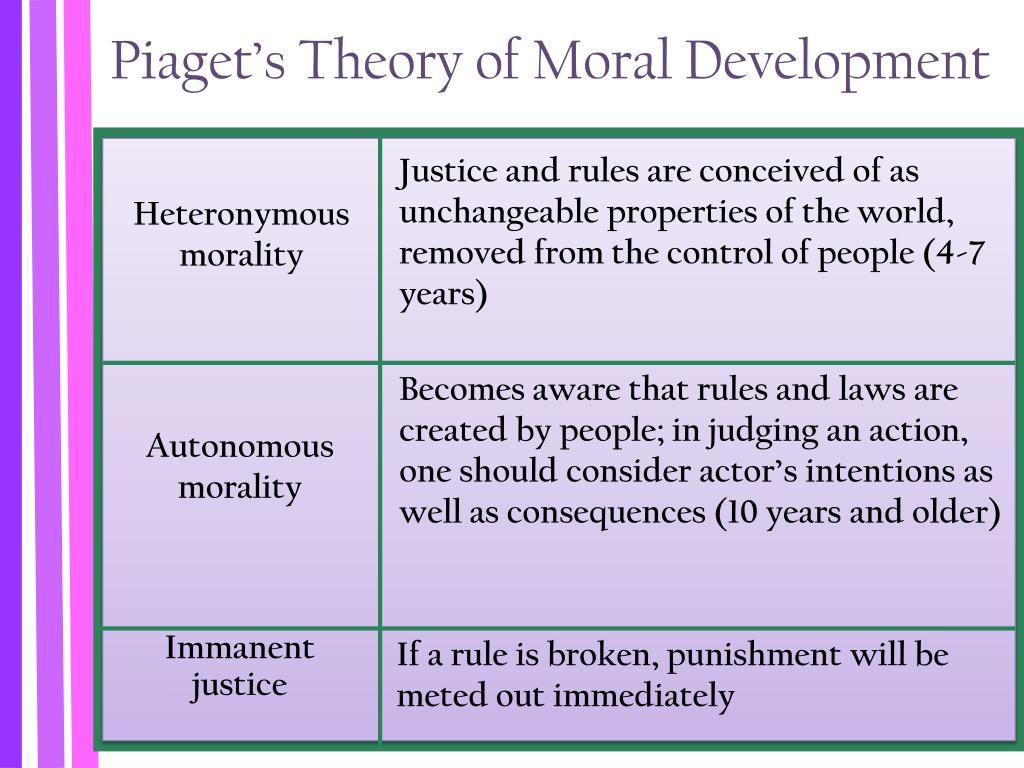- Get link
- X
- Other Apps
- Get link
- X
- Other Apps
The Moral Development or development of morality is the process whereby children learn to consciously distinguish right from wrong. During early childhood, a sense of morality is born when children realise that certain behavioural patterns are regarded as good and sometimes rewarded by parents. On the other hand, some actions are considered to be bad and are frequently accompanied by punishment. As children become older, morality begins to involve a complex set of ideas, values, and beliefs.
But his most important observations were made on the boys a fact that incurred later criticism, as will be seen shortly. Piaget often used a practiced technique of feigned naivety: He pretended to be ignorant of the rules of the games and asked the children to explain them to him. In this way he was able to comprehend the way that the children themselves understood the rules, and to observe as well how children of different ages related to the rules and the game. He came up with two main stages of moral development as follows:.
Heteronomous morality, or moral realism (5 to 10 years)
The word
heteronomous means under the authority of another. As the term suggests,
children of this stage view rules as stipulated by significant others (parents,
teachers as well as God), as having a permanent existence, unchanged and
requiring strict obedience.
During and
before early school years, children have little understanding of rules that
govern social behaviour. When they play rule-oriented games, for example, they
do not mind about wining, losing, or coordinating their actions with those of
others.
At the age
of 5, they start to show much more concern with and respect for rules.
According to Piaget, two factors limit children’s moral understanding:
•
The power of adults to insist that children comply,
which promotes unquestioning respect for rules and those who enforce them.
•
Egocentrism. Children think that all people view rules
in the same way, their moral understanding is characterised by realism. That
is, they consider rules to be permanent and features of reality rather than as
subjective principles that can be modified at will.
Children of the heteronomous stage believe in immanent justice- that
wrong doing inevitably leads to punishment. They think that moral order is only
maintained by punishment.
This stage is divided into three components or sub-stages according to
the child’s achievement in terms of morality developmental level.
-
In the first sub-stage, in which the child
merely handles the marbles in terms of his/her existing motor schemes, the
child’s Play is purely an individual endeavour, and “one can talk only of motor
rules and not of truly collective rules.
-
In the second sub-stage, about ages four to seven, game playing is
egocentric; children do not understand rules very well, or they make them up as
they go along. There is neither a strong sense of cooperation nor of
competition. It is equally important to note that egocentric children at the
preoperational stage seem to have “collective
monologues” rather than true dialogs, these observations do not seem
surprising.
-
The third sub-stage, at about ages seven to ten or eleven,
is characterised by incipient cooperation. Interactions are more social, and
rules are mastered and observed. Social interactions become more formalised as
regards rules of the game. The child learns and understands both cooperative
and competitive behaviour. But one child’s understanding of rules may still
differ from the next, thus mutual understanding still tends to be incomplete.
2. Autonomous morality or The Morality of Cooperation (about 10 years and above)
This is Piaget’s
second stage of moral development, in which children view rules as flexible,
socially agreed-on principles that can be revised to suit the will of the
majority. Children at this stage cease to regard unquestioning obedience to
adults as a sound basis for moral action. They recognise that sometimes there
may be justifiable reasons to violate or change a rule. Also, they discard the
view that wrongdoing is inevitably punishable. Instead, punishment should be
rationally related to the offence.
In this stage, beginning at about age eleven
or twelve, cooperation is more earnest and the child comes to understand
rules in a more legalistic fashion. Furthermore, Piaget calls this the stage of
genuine cooperation in which
the older children show a kind of legalistic fascination with the rules. They
enjoy settling differences of opinion concerning the rules, inventing new
rules, and elaborating on them. They even try to anticipate all the possible
contingencies that may arise. But in terms of cognitive development this stage
overlaps Piaget’s formal operational
stage; thus here the concern with abstraction and possibility enters the
child’s imagination.
Children’s Moral Judgments
Piaget’s studies of moral
judgments are based both on children’s judgments of moral scenarios and on
their interactions in game playing. In terms of moral judgments, Piaget found
that younger children (around ages four to seven) thought in terms of moral realism or moral heteronomy. These terms
connote an absolutism, in which morality is seen in terms of rules that are
fixed and unchangeable (heteronomy means “from without”). Guilt is determined
by the extent of violation of rules rather than by intention.

Comments
Post a Comment